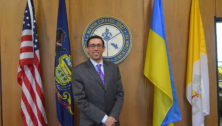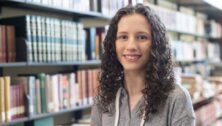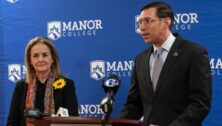Bucks County Leadership: Allison Mootz, Vice President of Student Affairs, Manor College
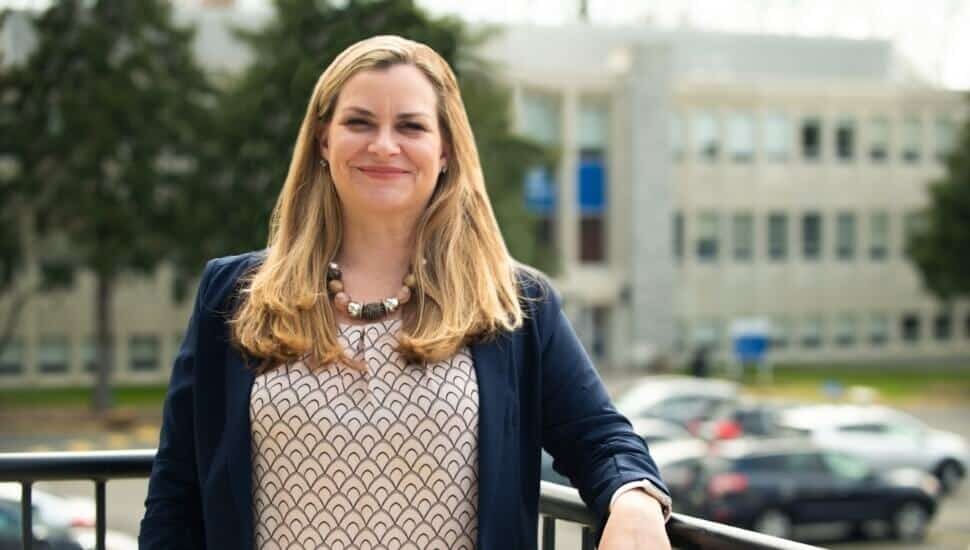
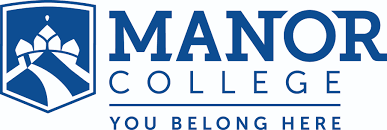
Allison Mootz, Vice President of Student Affairs at Manor College in Jenkintown, spoke to MONTCO Today about growing up near the beach in New Jersey, playing piano, xylophone and bassoon in her high school band and her first job bussing dishes at weddings. She also recalled playing catcher for her softball team as a teenager, a position that fit well with her “type A” personality.
Mootz also discussed how she ended up working in higher education and the initiatives she’s working on now at Manor College, including a food pantry for students, a program to help students in foster care and a grant to raise awareness about sexual assault.
Where were you born and where did you grow up?
I was born the oldest of three children in Point Pleasant, New Jersey, and grew up in Wall, New Jersey. I lived there until after college.
What did your parents do?
My mother was a legal secretary. Both of my parents started their first jobs out of college and stayed until retirement. I don’t know what role my father started in, but he ended up as a vice president of a warehouse management for a company that made feeder systems that go inside chicken houses.
What do you remember about growing up in Wall Township?
It was a nice area. I loved being by the beach and being able to go down there whenever we wanted. I lived about 5 miles away from the beach, but my grade school was a few blocks away, so we would walk down there for various school activities. That’s what I miss about New Jersey now that I live in Pennsylvania – the water.
Did you play any sports when you were growing up?
I played softball competitively through high school, but I decided not to continue in college. I was also a cheerleader, which I consider a sport, all through high school.
What position did you play in softball?
I was a catcher and I played third base. It depended on the team – for rec league, I played mostly catcher, and then for high school, I played mostly third base. I had a very good arm, so I could throw to second for people stealing bases.
Who first put you in the game as a catcher?
Probably my father, because he was my coach.
The catcher is running the show. Do you think your dad put you back there because he saw you were a leader?
Yes – I’m very type A.
Where does your competitive streak come from?
I’m not sure. My father played baseball as a boy and was very good at it, so maybe it came from him. My family wasn’t very competitive – I didn’t compete with my brothers a lot. I was just always a very driven person, whether it was school or sports. That’s my personality.
What about part-time jobs? Did you work when you were growing up?
As soon as I could start working, which I think was at 14, I did. I remember working at a beach club as a bus girl. I bussed tables at weddings. I would work so late – it probably wasn’t legal.
And I had various other jobs – at a grill on the beach, at a bagel shop. Probably the most memorable was as an ice cream scooper at Hoffman’s Ice Cream. Anyone who knows the Jersey Shore area knows Hoffman’s Ice Cream in Spring Lake, NJ. That was probably my favorite job.
What did you learn from those jobs that still influences how you work today?
I learned a lot about management styles. And scheduling – I still do scheduling now in my job. I always remember inventory management – not that I use it much now, but I do run a food pantry, so that experience helps me. I always remember “first in, first out.” Some things come back to you at random times and you realize you got that skill from the beachside grill.
Did the places you worked recognize your leadership ability as well?
The bagel shop I worked at made me a shift leader. I remember being in charge of the checklist of things like making sure the tables were cleaned. I thrive on those responsibilities. It worked well with my personality.
What kind of music were you listening to when you were growing up?
The biggest ones were Counting Crows, Pearl Jam and a lot of The Grateful Dead. Those were the concerts we always went to in the summertime.
I love music. I was a music minor in college, and I played in the band in high school, so I had an eclectic selection that I listened to.
What instrument did you play in the band?
To be in the jazz band in high school, which I loved, you had to play in the marching band. I played piano and xylophone in the jazz band, but they didn’t have those instruments in marching, so I had to pick another instrument. They tried me on French horn and that didn’t work. Then they tried bassoon, and that was a little easier.
I carried the bassoon into college for a brief period, maybe a semester. Piano has always been my instrument of choice.
I’m assuming you were a good student. Where did you end up going to college?
I went to Moravian College, now Moravian University in Bethlehem. I looked at a lot of places. I still remember the day I went for my first tour. I’d gone to Moravian and Lehigh University on the same day. The campuses were so vastly different in terms of size, obviously, but also the feeling of being welcomed. Lehigh’s wonderful, I’m sure, but it wasn’t for me. Moravian was smaller and homey, and I felt like that’s where I was supposed to be. I still love Moravian. I’m an active alum.
Looking back on it, was Moravian a good choice for you?
100-percent, I would definitely go back.
You said you minored in music – what did you major in?
I majored in business. I went in as a journalism major, but I realized that wasn’t the path for me and switched to business, which I really enjoyed. And then I got my master’s at Villanova in a totally different field.
Why wasn’t journalism right for you?
I don’t remember why I switched. I was the editor-in-chief of the student newspaper at Moravian, but I decided not to do the major.
And what was your master’s degree in?
I got my master’s in higher education leadership. I spent a couple years working after undergrad, and then I went back and got my master’s while I was working.
How did you decide that your calling was in higher ed?
It was during my senior year at Moravian. I’d been very involved in the newspaper and ran a number of student organizations on campus. I liked the organization and process of how things were run in that field. I spoke with the student activities director at Moravian and asked what her path was, and I followed a similar path later on.
Looking back over your career, who were the people who saw promise in you and opened up doors?
Definitely Dr. Jonathan Peri, Manor College’s president. He’s been one of my biggest supporters in my career. He’s wonderful to work for.
Were you there already when he joined?
I was there in a different role as the Director of Student Activities. Our Dean of Students at the time was an aging sister who was coming towards the end of her time in the role, and I was assisting her for about two years. I never made a big deal about it, but Dr. Peri saw the effort I’d been making and made the call to transfer me to that position. It’s bittersweet, because I loved Sister Frances, who was in that role.
Another person is my mentor, Dana Baker. She’s been in higher ed for about as long as I have, but she was my supervisor at my previous institution, DeVry University. She was a great leader to me. She always guided me in how to progress my career.
What do you think she saw in you?
My drive and my desire to progress in the field. I always have a very student-focused direction, and so does she. I think she recognized that in me. We always have the students’ interest at heart when we’re trying to plan something or change a policy or process.
How did you end up at Manor?
While DeVry set me off on a good path and gave me some good opportunities, I didn’t enjoy working in for-profit higher ed. So I’d been searching, and I found Manor. From the first time I walked in for that interview, I felt at home. It just felt right, and it was. I think I got an offer within a couple days. I went to a Catholic school growing up, and then I went to Moravian, which was small, so Manor fit into that world, which was what I was trying to get back to after being in for-profit for 12 years.
Here we are in the first quarter of the year. What are the opportunities and challenges that you’re focused on?
As an institution, our goals right now are staffing and keeping the good-quality staff that we have. Higher ed is a very transient landscape right now. After the pandemic, a lot of higher ed has been struggling in terms of staffing. I don’t think we’re immune to that. That’s where our biggest challenge is. We have so many good people at Manor who put all of their effort into making a good student experience, and we want to make sure we can keep them around.
How have Manor College students been impacted by the pandemic?
The difference I’ve seen is mostly with social interaction. Because they had two years where they weren’t interacting with anybody in person, their affect is a little different. It’s harder for them to interact, sometimes – not all of them, but a good majority. We’ve had situations where some students don’t know who to ask, so they just don’t ask. They muddle through without finding the answer to something. We struggle with that because our goal is to help you by answering the questions that you might not be able to find the answers to.
The other phenomenon I’ve seen, which I didn’t expect, is that we have so much more student involvement in terms of student clubs and activities than we had before the pandemic. It’s a great problem to have. It’s like, “Whoa, where did you all come from?” We’re getting record numbers at our events and students wanting to start organizations. I think they didn’t have the ability to express themselves in that way for a couple of years, so they’re finally able to put themselves out there. That’s the biggest surprise for me.
Are there any big initiatives you’re working on this year that are going to change the student experience at Manor?
A lot of my work is serving students outside the classroom, like social services: our food pantry, our foster program. Those are projects that I’m constantly trying to improve to make students’ lives better.
You launched the food pantry three or four years ago, right? What kind of impact is the Food Pantry having?
Bigger than I expected, for sure. We get more donations than I expected, which is wonderful. We kept it open and running during the pandemic – we would provide contactless pickup. At Thanksgiving, we do a holiday basket pickup. The food pantry is a big focus for us. It’s been one of the most fulfilling parts of my job in the time I’ve been in this field.
We have also been blessed to get the It’s On Us grant for sexual assault awareness. We’ve done that year over year, and this year we got the biggest award yet, so we’re focused on putting different aspects of that grant into place.
What do you do with all that free time that you have, Allison?
Well, I am a full-time caregiver to my husband, who’s disabled. We see friends and family when we can and we love to cook. I also love to read and spend time with my two Ocicats. I really don’t have much free time.
Do you read much?
I do love to read. I like Margaret Atwood, who wrote “The Handmaid’s Tale.” I will always love Stephen King – I’m reading him right now.
What’s something significant you’ve changed your mind about in the last five years?
The value I put on work versus home life. My perspective on how much to value home life definitely changed. Especially with the pandemic – being in my situation, working from home was a blessing. I love being on campus – it’s a joy to go in every day and see the students – but working from home changed my perspective.
It’s a crazy world out there, Allison. What keeps you hopeful and optimistic?
Seeing our students. When they come in, [so many of them think?] they might not have been able to go to college. Then a few years later, they walk across the stage, and their family is there to see them. I really enjoy orientation and graduation because it’s a culmination of the hard work these students are doing.
I know every college student works hard, but I think ours work harder. It’s difficult for them to get through all of the challenges they have, not only at school but at home. I don’t know if everyone sees that in our students, but they give me hope, because when I see the perseverance they have and all of the things they’re doing outside of school and making it through classes, it’s inspiring.
Like our foster care program that I oversee – they don’t have anyone to fall back on. We have two current students who I think are going to be our first two graduates out of that program. That’s very inspiring.
Finally, Allison, what’s the best advice you ever received?
I keep going back to my parents. I can’t think of something specific that they said, but when my dad was home, he was home. When he was at work, he was at work. Same goes for my mother, they were just very connected to us growing up.
And they were always together. It’s something that I always admired in them. When they were there, they were present with all three of us. I think that example is how I’ve lived my adult life-being present, connected, and loving with family and friends.
Connect With Your Community
Subscribe for stories that matter!
"*" indicates required fields



























